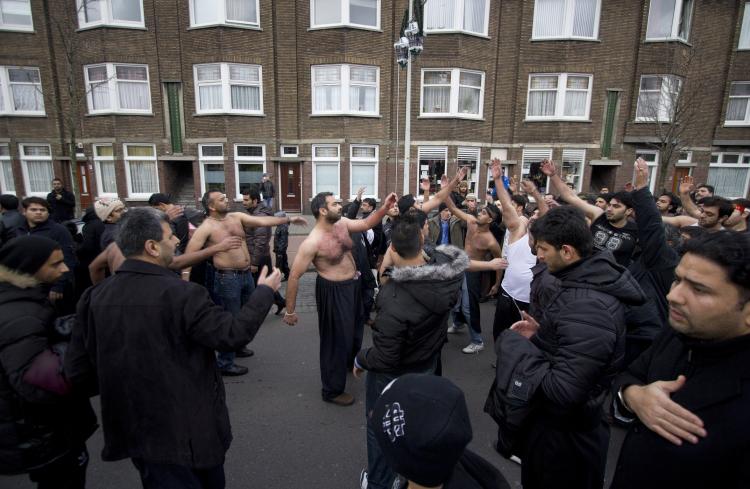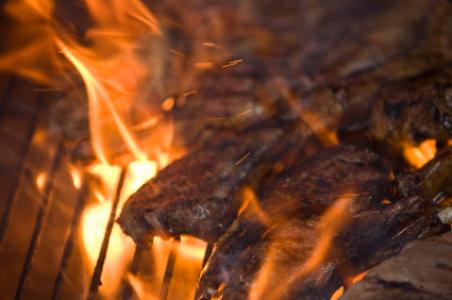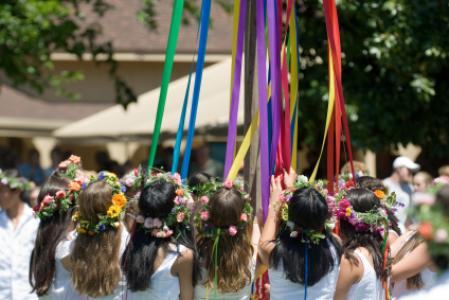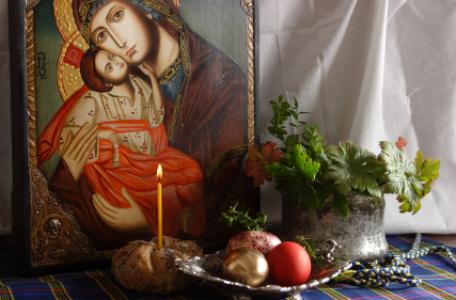
Yom HaShoah
Yom Hashoah, held on the 27th day of the month of Nisan, remembers the Holocaust victims who died during World War II.
On Ashura, many Muslims in the UK fast to commemorate, among other things, the day Moses and the Israelites were saved from the Egyptians. In the west, Ashura is best known for a ritual of self-flagellation, which is only observed by a minority of Muslims.

Shia Muslims on Ashura
©iStockphoto.com/thehague
Ashura is observed on the tenth day of Muharram, the first month of the Islamic calendar.
Muslims use a lunar calendar which differs in length from the Gregorian calendar used worldwide. This means the Gregorian date of Muslim holidays shifts slightly from one year to the next, falling about 11 days earlier each year.
The timing of Muslim months and holidays generally depends on the sighting of the Moon's crescent following New Moon. Because the Moon's visibility depends on clear skies and several other factors, we cannot predict the exact date of Muslim holidays with certainty.
Also, since the Moon is never visible in all world regions at once and current local dates can vary from one country to another, a holiday may fall on different dates according to a country's longitude and time zone. So, some Muslims may celebrate a holiday one day earlier than others, depending on their country or region of origin.
While Ashura is an important observance, especially for Shia Muslims, there are no bank holidays associated with this particular date in the United Kingdom. However, since the Gregorian date of Muslim holidays changes every year, Ashura can fall on existing UK bank holidays.
In some UK cities, Shia Muslims may organize processions or demonstrations on Ashura, so some streets may temporarily be closed to traffic. Some Muslim-owned businesses may close or have reduced opening hours on this day.
For Sunni Muslims, which form a majority of the UK Muslim population, Ashura is a day of fasting and prayer.
The Ashura traditions followed by Shia Muslims, on the other hand, are a lot more public. To mourn the martyrdom of Husayn ibn Ali, the Prophet Muhammad's grandson, Shiites form processions which traditionally involve rituals of self-flagellation.
In some regions of the world, this custom involves a violent and often bloody display of grief and devotion, which often includes beating oneself with chains, swords, or other blades. However, this practice has been discouraged by many Shia leaders and it is all but non-existent in the UK. Here, Ashura processions may involve loud chanting and participants beating their chests.
UK Shia Muslims have also organized peaceful Ashura demonstrations in the past, for example, to denounce Islamic terrorism and racism. In keeping with the tradition of blood-letting associated with Ashura, some Muslims also donate blood on this day.
Ashura is the climax of a Shia tradition called the Mourning of Muharram or Remembrance of Muharram, which is dedicated to the memory of Husayn ibn Ali, who was martyred during the Battle of Karbala in 680 CE. This event was central to the formation of the Sunni and Shia factions, the two major denominations of Islam worldwide.
While Sunni Muslims also recognize this historical event, their interpretation of Ashura and the traditions associated with this holiday center on commemorating a number of events passed down by religious lore. These events include the Parting of the Red Sea which resulted in the escape of Moses and the Israelites from Egypt, the Prophet Muhammad's arrival in Medina, and the day Noah left the Ark after the great flood had receded.
What is the Jewish equivalent of Ashura?
Some Muslims eat a symbolic meal or dessert on Ashura which is known as Noah's Pudding or Ashure. The ingredients may include water, grains, pulses, fresh and dried fruit, salt, and honey. The dish may be garnished with orange or lemon rind, spices, nuts, and pomegranate seeds. Muslims are urged to enjoy the dish and to share it with their neighbors.
While the traditions associated with Ashura differ greatly between Sunnis and Shiites, it is observed by all Muslims in some form. Most Muslims in the UK are Sunni. Adherents of the Shia tradition are only 5-8% of the country's total Muslim population.
With nearly 2.8 million Muslims living in the United Kingdom, which equals about 4.8% of the population, Islam constitutes the second largest religion in the country, after Christianity. The largest Muslim community can be found in London. The municipalities of Bradford, Luton, Blackburn, Birmingham, and Dewsbury also have significant Muslim populations.
Note: Regional customs or Moon sightings may cause a variation of the date for Islamic holidays, which begin at sundown the day before the date specified for the holiday. The Islamic calendar is lunar and the days begin at sunset, so there may be one-day error depending on when the Crescent Moon is first seen.
| Year | Weekday | Date | Name | Holiday Type |
|---|---|---|---|---|
| 2019 | Tue | Sep 10 | Ashura | Muslim |
| 2020 | Sun | Aug 30 | Ashura | Muslim |
| 2021 | Thu | Aug 19 | Ashura | Muslim |
| 2022 | Mon | Aug 8 | Ashura | Muslim |
| 2023 | Fri | Jul 28 | Ashura | Muslim |
| 2023 | Sat | Jul 29 | Ashura | Muslim |
| 2024 | Wed | Jul 17 | Ashura (Tentative Date) | Muslim |
| 2025 | Sun | Jul 6 | Ashura (Tentative Date) | Muslim |
| 2026 | Fri | Jun 26 | Ashura (Tentative Date) | Muslim |
| 2027 | Tue | Jun 15 | Ashura (Tentative Date) | Muslim |
| 2028 | Sat | Jun 3 | Ashura (Tentative Date) | Muslim |
| 2029 | Thu | May 24 | Ashura (Tentative Date) | Muslim |
While we diligently research and update our holiday dates, some of the information in the table above may be preliminary. If you find an error, please let us know.

Yom Hashoah, held on the 27th day of the month of Nisan, remembers the Holocaust victims who died during World War II.

Many Orthodox Christians in the United Kingdom commemorate Jesus Christ’s resurrection on Easter Day, also known as Pascha.

May Day, or the Early May Bank holiday, is on the first Monday of May each year.

Many Orthodox churches in the United Kingdom observe Easter Monday on the day after the Orthodox Easter Sunday date.